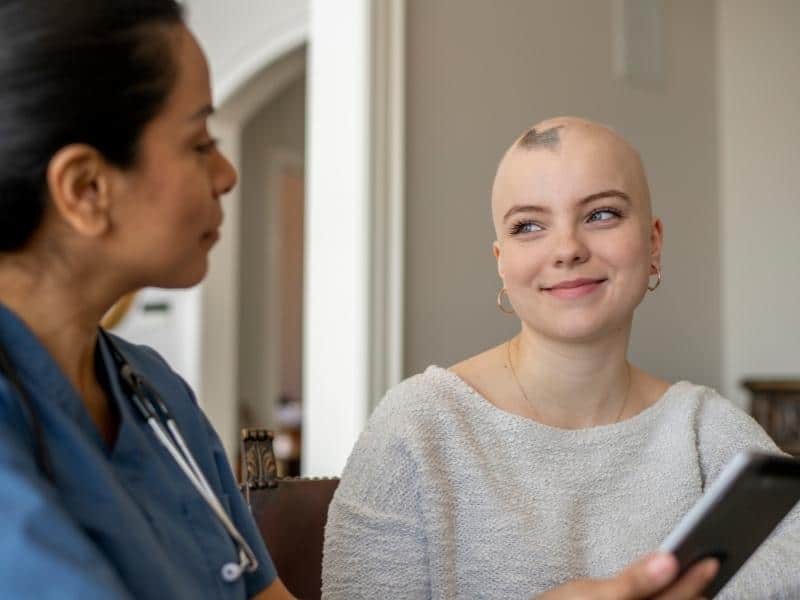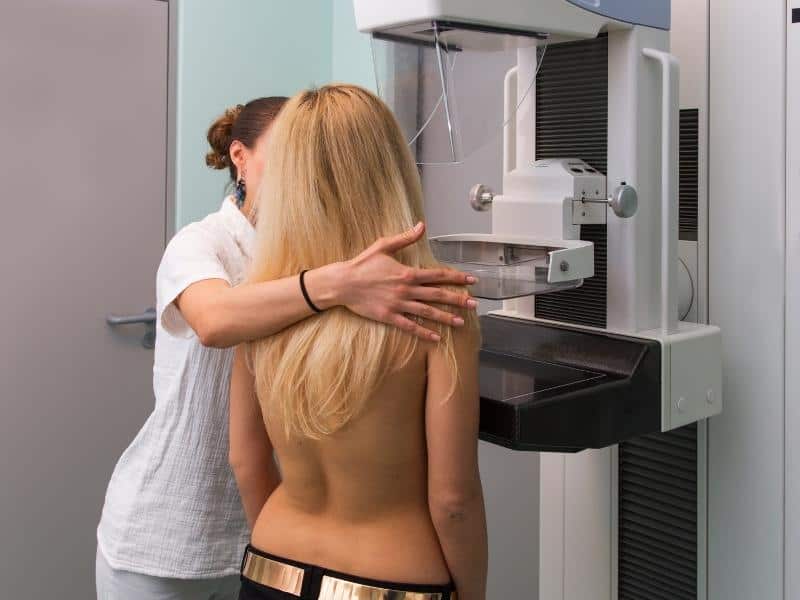Oncology nurses are in big demand for employment. At the same time, an oncology nurse position can be very competitive.
Since you’ve been offered a job interview, the employer already thinks you may be a great fit. During the interview, you need to convince them they were right.
If you prepare beforehand to answer questions commonly asked by interviewers, you will increase your chances of landing the position.
*Disclosure: This article on oncology nurse interview questions may contain affiliate links. If you click and make a purchase, I may receive a commission. For more info, please see my disclaimer.
Common Oncology Nurse Interview Questions & Answers
1. Tell me about yourself.

This question is usually asked at the beginning or near the beginning of the interview.
The interviewer seeks a summary of your qualifications as well as a glimpse of your personality and general approach to nursing.
Most of the time, it’s not an invitation for you to tell the interviewer all about your childhood and the challenges you faced when studying nursing.
Instead, try something like…
“I’ve been passionate about nursing since I was a child and watched my (family member) struggle with cancer treatment and eventually pass on.
Now that I have qualified as a registered nurse, I would like to start my career as an oncology nurse to help other patients battle the disease.
Working for a center of excellence in cancer treatment and patient care like your hospital will help me learn from the best in the field. In my spare time, I love to unwind and hike nature trails together with my golden retriever”.
2. Why do you want to work as an Oncology Nurse?

It’s good to research the company values (and their mission statement) before the interview and see if you can link them to your own career goals.
Your answer may include phrases like: you want to work for a hospital that values patient care and provides vital services for their patients, or something like that.
Have a look at this model answer below to give you an idea of how to answer this question.
“I was placed in an Oncology ward on our rotations as a student, and I enjoyed how the oncology nurses forge relationships with their patients.
Even for those with a poor prognosis, providing treatment that improves their quality of life is rewarding. It feels like I make a real difference here.”
3. Where do you see your career in Oncology in five years?

It’s important to let the interviewer know how your personal career goals fit the company goals. Perhaps try saying something like this…
“I would like to gain experience at your hospital and in a year or two enroll for the Oncology Nursing Certification so that I can improve my knowledge and skill to better care for my patients.
I am committed to working in the oncology field, and once I am certified, I would love to be the head nurse of an oncology unit should an opportunity arise.”
4. How would you rate your communication skills?

Good communication skills are a very important part of patient care in the oncology setting.
You will need to communicate sensitive information to patients and their families. You must also communicate with other health care providers like medical staff and pharmacists.
Perhaps, you could include an example of how you handled miscommunication incidents in the past or relate an incident where communication helped a patient.
“I am a great listener and always communicate with other health team members to make sure patient’s treatment is not affected.
When I was a student nurse, there was an incident when communication made a difference. I made a patient’s bed and quickly tidied her bedside locker.
When I looked into a drawer, I found a small box full of pills that were a part of the patient’s treatment. Instead of swallowing them, the patient secretly hid the pills and pretended that she had taken them.
When I questioned her about that, she admitted she did not like the heartburn the pills caused, so she did not take them.
I reported it to the RN in charge, and later I heard that the patient’s medication was changed to reduce the side effects.”
5. What do you feel will be the most challenging part of being an oncology nurse?

By asking this question, the interviewer wants to know whether you have any insight into oncology nursing to provide skilled care to vulnerable patients.
Your answer should include a plan for overcoming these challenges or mention a skill set that will help you resolve the challenges successfully.
“Working in the oncology unit can be challenging, especially when a patient loses their fight with cancer.
With that said, I feel that the most challenging part is that there are not enough hours in a shift to spend with patients one on one and help them emotionally.
There are so many administrative duties that cut into the patient care time. I try to keep track of time and work quickly so that I can carve out at least a little time during each shift to spend chatting with patients.”
6. What motivates you at work?

Keep your answer to one or two key points that the interviewer wants to hear.
The safe options are to say that you’re motivated by stretching your abilities to achieve more and receive recognition for your efforts.
The second point you may want to mention is that you love challenging assignments.
“I love being part of the team and facing the challenges each day brings. If things go wrong, it is great to speak to other nurses and get the support, advice, and encouragement I need to carry on.”
7. Tell me what you know about our facility?

You are sure to impress your interviewer with your knowledge about the institution where you want to work.
Doing research before the interview about their vision and mission statements will come in handy when answering this question if you know someone who already works there, even better.
Ask them questions about what it’s like to work there to formulate a concise answer.
“I would love to work for your hospital (name of the place where you are applying) because it is known for its commitment to providing excellent oncology research, treatment, and patient care.
Your doctors are at the top of their game, and your oncology unit is well known and respected in the community.”
8. What salary are you expecting?

The salary question is usually a loaded question, and you need to know how to navigate this one.
It’s a good idea to find out what your remuneration should be beforehand.
Horror stories are floating around that some employees are notoriously underpaid because they lack the negotiating skills or the willingness to negotiate for a higher wage.
Try to avoid mentioning any figures because you can kiss the job goodbye if the amount you give is too high.
At the same time, you need to value your time and expertise and not sell yourself short. When asked this question, you may want to say something like
“I am unsure of the actual amount, but I feel that my wage should be on par with the standard average set for this position according to my qualifications.”
9. Why should we hire you?

Now is the time to tell the interviewer all the skills you will bring to the job. Emphasize your strengths and relate how hiring you will benefit the institution.
You may want to reiterate your dedication to nursing and tell the interviewer how it will help them uphold their vision of providing the best quality care for their patients.
I am committed to working in an oncology unit and studying further to become a certified oncology nurse. I have good communication and teamwork skills.
If hired, I will continue to use my compassion, insight into the disease process, and skills to provide excellent patient care if I am selected for this position.
10. Do you have any questions?

This is usually the last question in the interview. The interviewer asking this is generally looking at your initiative and interest in the position.
Never answer that you have no questions, as the interviewer will think you are not interested in the position.
Instead, ask questions about any job details, like the institution policy on the orientation period, any possibilities for rotation between the departments, or any chances for further education offered to employees.
Possible questions you may want to ask are:
“How many nurses work on each shift in the unit?”
“How will the onboarding process work?”
“Does the hospital support staff studying further, and are there any professional development programs offered?”
Related: Check out this article on the top nursing interview questions you need to ask your interviewer.
Find Your Next Nursing Job
Use our nursing job board to start looking for and applying to great nursing jobs near you.
Last thoughts
Take a deep breath! Remember getting an interview is a significant part of the job-hunting process.
Study these questions, make sure you get a good night’s rest and be prepared to explain to the hiring manager why you’re the absolute best nurse for the job despite all the other candidates.

